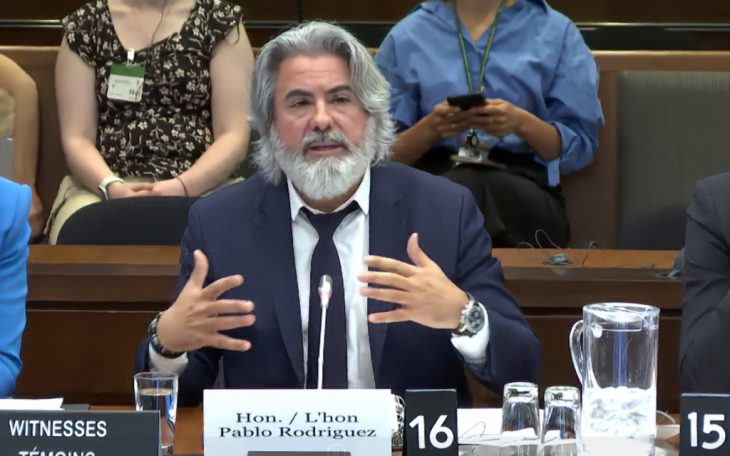
By Christopher Guly
OTTAWA — As Bill C-18 received royal asset Thursday after a 56-22 Senate vote this afternoon, Meta – one of the two web giants directly affected by the Online News Act – said that its social-media platforms Facebook and Instagram would no longer provide news to its Canadian users.
“We have repeatedly shared that in order to comply with Bill C-18, passed today in Parliament, content from news outlets, including news publishers and broadcasters, will no longer be available to people accessing our platforms in Canada,” said Meta in a statement.
“Earlier this month, we announced that we were conducting product tests to help us build an effective product solution to end news availability as a result of C-18. These tests are ongoing and currently impact a small percentage of users in Canada.”
“The changes affecting news content will not otherwise impact Meta’s products and services in Canada” and that Canadians “will always be able to connect with friends and family, grow their businesses and support their local communities.”
Meanwhile, The Globe and Mail reported on Thursday that Canadian Heritage Minister Pablo Rodriguez was in talks with executives of Google to break the impasse with the online search giant over its threat to also withdraw news from its platform.
“We’re doing everything we can to avoid an outcome that no one wants,” said Google spokesperson Shay Purdy in a statement. “Every step of the way, we’ve proposed thoughtful and pragmatic solutions that would have improved the bill and cleared the path for us to increase our already significant investments in the Canadian news ecosystem.”
“So far, none of our concerns have been addressed,” he said. “Bill C-18 is about to become law and remains unworkable. We are continuing to urgently seek to work with the government on a path forward.”
Last month, Meta and Google senior executives told the Standing Senate Committee on Transport and Communications that requiring platforms to compensate news publishers for linking to their articles under the Online News Act was “unworkable,” for Meta, and “reasonable” for Google to “reconsider” why it would link to media organizations’ sites.
Laura Scaffidi, Rodriguez’s press secretary, told the Globe that once Bill C-18 becomes law, “the government will engage in a regulatory and implementation process” in which “all details will be made public before any tech giant is designated under the Act.”
However, Michael Geist, who holds the Canada Research Chair in Internet and e-commerce Law at the University of Ottawa, said in an interview that the federal government has made “an epic and massive miscalculation” over the two tech titan’s opposition to C-18 by seeming to dismiss it as “a bluff” and did not “appear to have a plan B.”
“Facebook, in particular, was consistent from day one that if the bill passed in its current form they were out of news in Canada,” said Geist. “And Google has made it clear that the prospect of uncapped liability for links was just something that the company could not agree to.”
“I don’t think it’s a bad day for the platforms,” he told Cartt.ca. “I think it’s a bad day for Canadian media that will lose hundreds of millions of dollars from the lost links that previously provided significant value, and it’s disastrous for a government that seemed to have thought its legislation would have no adverse consequences, despite the obvious warning signs that have been there for months.”
Canada’s news industry welcomed C-18 about to become law.
“This much-needed legislation will ensure that our homegrown news businesses, including those of our private broadcasters, have a framework for fair negotiation with online platforms on the value gained from their content,” said the Canadian Association of Broadcasters (CAB) in a statement.
CAB president Kevin Desjardins said that the Online News Act “is a positive step in righting the imbalance that exists between Canadian news businesses and the foreign web giants that benefit financially from using their content,”
The CAB said that the adoption of Bill C-18, as well as the association’s proposed amendment on its coming into force within the next six months, “will bring about necessary changes to support the sustainability of our vital Canadian news organizations.”
Marla Boltman, executive director of the Canadian broadcasting advocacy group, FRIENDS, said in a statement to Cartt.ca that “the passing of the Online News Act is an essential step in providing much needed support for Canadian journalism.”
“Compelling foreign tech giants to enter into compensation agreements with news outlets corrects a market imbalance that has threatened the very existence of the Canadians news sector and, by extension, our democracy.”
“We wholeheartedly applaud Parliament for getting this challenging bill across the finish line while staring down the barrel of Google and Facebook’s threats to block news in Canada,” said Boltman. “Our hope is that these foreign tech giants will now abandon their intimidation tactics and show the Canadian democratic process the respect it deserves.”
New Media Canada, which represents the country’s print and digital media industry, welcomed the passage of C-18 that will allow news businesses “to come together to negotiate fair market arrangements for news content with dominant search and social media companies,” it said in a statement.
“This is an important first step to level the playing field and address the significant market power imbalance between publishers and platforms and to restore fairness and ensure the sustainability of the Canadian news media ecosystem,” said Jamie Irving, chair of News Media Canada.”
“Real journalism, created by real journalists, continues to be demanded by Canadians and is vital to our democracy, but it costs real money,” added Paul Deegan, president and chief executive officer of News Media Canada.
“Original fact-based, fact-checked journalism from authoritative news brands matters, and publishers look forward to participating in the bargaining process in good faith,” he said, offering credit to Rodriguez “for setting the table for commercial negotiation, backed up by the teeth of final offer arbitration.”



